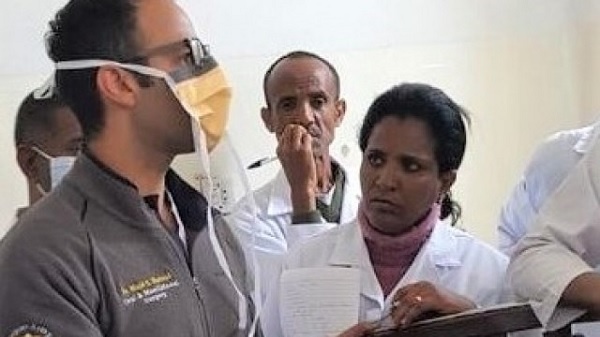
The medical deployment was an opportunity, for Army Maj. (Dr.) Majd Haddad to provide vital surgical care to more than one-hundred Ethiopians
By Kirk Frady (U.S. Army)
SEMBACH, Germany – An Army oral and maxillofacial surgeon assigned to Landstuhl Regional Medical Center and the 212th Combat Support Hospital put his medical skills to use recently during a medical deployment to Ethiopia.
For Army Maj. (Dr.) Majd Haddad, it was an opportunity to provide vital surgical care to more than one-hundred Ethiopians, most of whom were injured in inter-ethnic conflicts and fighting in the region.
The four-week deployment was part of a U.S. Africa Command Medical Readiness Exercise conducted in July in Addis Ababa, Ethiopia. The goal of the deployment was to strengthen U.S. medical readiness training, reinforce cooperation between the United States, Ethiopia and Ghana, and strengthen the capacity of the Ethiopian Defense Forces to perform medical operations.
Haddad deployed with a team of approximately 20 medical personnel from the 212th Combat Support Hospital, which is part of the 30th Medical Brigade headquartered at Sembach, Germany.
“The medical team enhanced their individual critical skills as part of a Forward Resuscitative Care Team,” said Haddad. “We shared medical best practices and tactics, techniques, and our procedures for surgical trauma response were evaluated and assessed.”
While all military deployments can be challenging, this particular deployment posed its own set of unique challenges.
“One of the main challenges we faced was being able to operate and provide care with very limited resources and support,” said Haddad. “In our medical system, we have unlimited resources and capabilities when it comes to patient care and we never put a price tag on quality care. Unfortunately, this is not the case in Ethiopia as they have limited resources.”
“The sharing of ideas was helpful to all of us,” Haddad added. “We worked together side-by- side, sharing and collaborating and learning about resource management.”
Maj. Haddad and Spc. Stanislas Ogokeh, a (68E) dental specialist who is also assigned to the 212th Combat Support Hospital, worked alongside Ethiopian dentists and other trauma surgeons to provide care to Ethiopian Soldiers and other injured and ill patients.
“Most of the care we provided was trauma management,” said Haddad. “This was due, for the most part, to local inter-ethnic conflicts in the region. But, we also included pediatric care and pathology.”
Haddad says providing medical care to those in need can be gratifying work.
“It was extremely rewarding professionally and personally to be part of this mission,” said Haddad. “My role as an oral and maxillofacial surgeon is to be part of a trauma team that helps save and care for wounded patients. During this mission, we were able to provide care to those in need, while maintaining our critical surgical skills with limited resources at the same time.”
“We were all surprised how hospitable and kind the Ethiopian people were,” added Haddad. “They were very welcoming and excited to be able to work together.”
In addition to the surgical care, the deployed medical team provided several lectures on facial trauma and airway management to Ethiopian medical students and interns.
Source: U.S. Army
